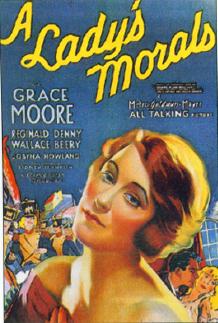A Lady's Morals is a 1930 American pre-Code film directed by Sidney Franklin. Its plot is a highly fictionalized account of opera singer Jenny Lind. The film features Grace Moore as Lind, Reginald Denny as a lover and Wallace Beery as P. T. Barnum. It contains operatic arias by Moore.
| A Lady's Morals | |
|---|---|
 | |
| Directed by | Sidney Franklin |
| Written by | Dorothy Farnum Hanns Kräly John Meehan Arthur Richman Claudine West |
| Produced by | Irving Thalberg |
| Starring | Grace Moore Reginald Denny Wallace Beery Gilbert Emery |
| Cinematography | George Barnes |
| Edited by | Margaret Booth |
| Music by | Vincenzo Bellini |
| Distributed by | Metro-Goldwyn-Mayer |
Release date |
|
Running time | 87 minutes |
| Country | United States |
| Language | English |
Wallace Beery would play Barnum again four years later in The Mighty Barnum (1934), with Virginia Bruce as Jenny Lind.
Plot
editThis article needs a plot summary. (December 2023) |
Cast
edit- Grace Moore as Jenny Lind
- Reginald Denny as Paul Brandt
- Wallace Beery as P. T. Barnum
- Jobyna Howland as Josephine
- Gus Shy as Olaf
- Gilbert Emery as Broughm
- George F. Marion as Innkeeper
- Paul Porcasi as Innkeeper
Soundtrack
edit- "It Is Destiny": Lyrics by Clifford Grey, music by Oscar Straus, played by Reginald Denny on piano and sung by Grace Moore
- "Rataplan" (from La fille du régiment): Music by Gaetano Donizetti, sung by Moore
- "Student's Song": Music by Oscar Straus, lyrics by Clifford Grey, sung by students escorting Jenny home
- "Oh Why": Lyrics by Arthur Freed, music by Herbert Stothart and Harry M. Woods, played by Moore singing and on piano
- "Casta Diva" (from Norma): Music by Vincenzo Bellini, played at an opera house and sung by Moore
- "Swedish Pastorale": Written by Howard Johnson and Herbert Stothart, sung by a group in Sweden
- "Lovely Hour": Words and music by Carrie Jacobs-Bond, sung first by Moore off-screen and reprised at P. T. Barnum's show in New York
- "I Hear Your Voice": Music by Oscar Straus, lyrics by Clifford Grey
Reception
editIn a contemporary review for The New York Times, critic Mordaunt Hall called the film's title "meaningless and unsuitable" and wrote: "This story, one of half-truths and fiction, ... is a conventional narrative and although Mr. Franklin delivers some imaginatively conceived sequences, there are others that are emphatically old fashioned in design. ... It is too mindful of the old things in motion pictures."[1]
Remake
editThe film was remade as the 1932 American French-language film titled Jenny Lind.
References
edit- ^ Hall, Mordaunt (November 8, 1930). "The Screen: 'The Swedish Nightingale'". The New York Times. p. 21.
External links
edit- A Lady's Morals at IMDb
- A Lady's Morals at AllMovie
- A Lady's Morals plot by Sanderson Beck (1999)